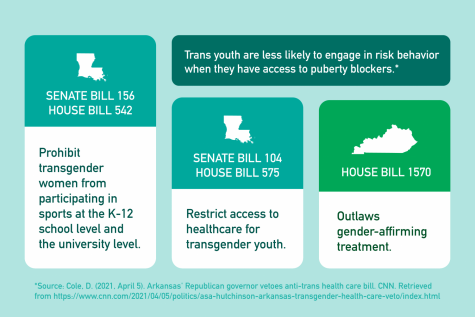Recent onslaught of anti-trans legislation threatens individuals in several states
April 7, 2021

Over the past few months, several states across the country have been the center of legal controversies surrounding the rights of marginalized communities. States such as Louisiana and Arkansas have actively been proposing legislation to severely limit the liberties of transgender individuals, especially those under the age of 18.
In Louisiana, four bills have been filed that, if passed, would restrict the rights of transgender people in the state by preventing them from accessing critical services and prohibiting them from certain spaces.
Senate Bill 104 and House Bill 575 both propose restricting access to healthcare for transgender youth. The Senate bill, sponsored by Republican Sen. Mike Fesi, would require people under the age of 18 to obtain parental permission before getting any gender-related medical care. The bill, if successful, would give parents the power to block a child from receiving health care related to their gender identity. The House bill, sponsored by Republican Rep. Gabe Firment, would disallow transgender people under the age of 18 from accessing any sort of drug therapy or surgery that would help them align their physical appearance with their gender identity. This bill would apply to all transgender people under 18, regardless of what medical professionals or their guardians support. This bill would also forbid school staff from discussing the gender identity of transgender students with them.
Two other bills, Senate Bill 156 and House Bill 542, proposed by lawmakers Beth Mizell and Beryl Amedee would entirely prohibit transgender women from participating in sports at the K-12 school level and the university level. The bills also make it possible for athletes, coaches and others to sue transgender athletes for any “harm” their participation may have caused. Similar bans have been proposed in over 20 other states including Mississippi, Tennessee and Arkansas. Currently, the NCAA allows transgender students to participate in competitive sports, and Louisiana universities largely follow that policy. The Louisiana High School Athletic Association, however, does not allow transgender students to compete in sports unless they have undergone all available sex reassignment surgery and have legally changed their gender identity.
Arkansas also recently attempted to restrict the rights of transgender people in a highly controversial piece of legislation, House Bill 1570, which aimed to prohibit transgender people under the age of 18 from receiving gender affirming treatment such as sex reassignment surgery. Opponents of the bill, dubbed the Save Adolescents From Experimentation Act, argue that the legislation poses a great danger to transgender youth, who are are less likely to engage in risk behavior when they have access to puberty blockers. On Monday, Governor Asa Hutchinson vetoed the bill, a surprising move considering the governor’s weak track record on LGBTQ+ rights. For example, Hutchinson recently signed the Medical Ethics and Diversity Act into law, allowing healthcare workers to refuse non-emergency service to transgender individuals if they have moral objections. The very next day, the Arkansas General Assembly overturned the governor’s veto, making Arkansas the first state to outlaw gender-affirming treatment.
These bills do not exist in a vacuum. Rather, they are indicative of a growing pattern of anti-trans legislation being passed and accepted. Beyond the bills mentioned here, states such as Texas, Michigan, South Carolina and more have also filed anti-trans legislation.
The four bills filed in Louisiana are set to be debated in the upcoming legislative session on April 12. A petition opposing the anti-trans legislation in Louisiana, sponsored by the Louisiana Trans Advocates, has reached over 500 signatures and can be accessed here.






















Concerned Student • Apr 15, 2021 at 2:24 pm
What on earth is wrong with you people? Do you not understand how giving puberty blockers to children is blatantly evil? Also, I’d love to see one of yalls daughter compete in women’s wrestling and get the life knocked out of her by a “trans girl” with unfair biological advantages.
Felestia • Apr 14, 2021 at 5:05 pm
As a queer, non-binary, spectral person of color with asexual tendencies I disapprove this petition.
Rehana • Apr 12, 2021 at 1:36 am
I support this petition.
Rehana gardiner • Apr 12, 2021 at 1:34 am
As a parent of a transgender daughter I support this petition to prevent this bill being passed.